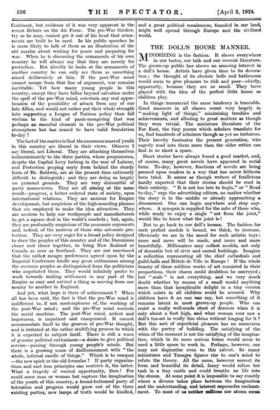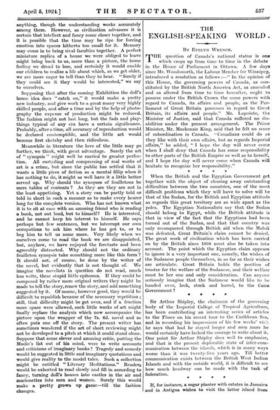THE DOLL'S HOUSE MANNER.
Nr in is the fashion. It shows everywhere -I- n our tastes, our talk and our current literature. The grown-up public has shown an amazing interest in a doll's house. Artists have given time to its decora- tion ; the thought of its electric bells and bathrooms would seem to give pleasure to rich and poor—chiefly, apparently, because they are so small. They have played with the idea of the perfect little house as children play.
In things immaterial the same tendency is traceable. Good manners in all classes count very largely in " making light of things," minimizing troubles and achievements, and alluding to great matters as though they were trivial. The miniature literature of the Far East, the tiny poems which scholars translate for us, find hundreds of admirers though as yet no imitators. Their brevity fascinates the present generation, who eagerly read into them more than the older critics can find in so short a space.
Short stories have always found a good market, and, of course, many great novels have appeared in serial form. To-day, however, fractions of novels are being pressed upon readers in a way that has never hitherto been tried. It seems as though writers of feuilletons hardly expected that their stories should be read in their entirety. " It is not too late to begin," or " Read to-day," urge the advertising editors, no matter whether the story is in the middle or already approaching a denouement. One can begin anywhere and stop any- where. A synopsis is supplied for the sake of those who, while ready to enjoy a single " cut from the joint," would like to know what the joint is 1 But to go back to our doll's houses. The fashion for such perfect models is bound, we think, to increase. Obviously we are in the mood for such artistic toys : more and more will be made, and more and more beautifully. Millionaires may collect models, not only of domestic but of civic and sacred buildings. Imagine a collection representing all the chief cathedrals and guild-halls and Hotels de Ville in Europe ! If the whole beauty of these sublime works of art consisted in their proportions, their charm could doubtless be conveyed ; but " scale " is not everything, and we very much doubt whether by means of a small model anything more than that inexplicable delight in a tiny version which exists in all children coal be aroused. Why children have it no one can say, but something of it remains latent in most grown-up people. Who can resist a really well-made chest of drawers when it is only about a foot high, and what woman ever saw a doll's tea-set in really fine china without longing for it ? But this sort of superficial pleasure has no connexion with the poetry of building. The satisfying of the whim of the moment is not the satisfying of the imagina- tion, which in its more serious forms would seem to need a little space to work in. Perhaps, however, one may not dogmatize even to this extent. So many miniatures and Tanagra figures rise to one's mind to refute the theory. All the same, however correct its form and beautiful its detail, fancy would refuse her task in a tiny castle and could breathe no life into the stones. At some point it is impossible to say exactly where a divorce takes place between the imagination and the understanding, and interest supersedes enchant- ment. To most of us neither millions nor atoms mean anything, though the understanding works accurately among them. However, as civilization advances it is certain that intellect and fancy come closer together, and it is possible that the time may be ripe for forcing emotion into spaces hitherto too small for it. Memory may come in to bring rival faculties together. A perfect miniature replica of a house we were obliged to leave might bring back to us, more than a picture, the home feeling we dread to lose, and certainly it would enable our children to realize a life about which, as we get older, we are more eager to tell than they to hear. " Surely if they could see it they would be interested," we say to ourselves.
Supposing that after the coming Exhibition the doll's house idea does " catch on," it would make a pretty new industry, and give work to a great many very highly skilled people, and after a time and by the help of photo- graphy the expense of production might be reduced. The fashion might not last long, but the fads and play- things typical of any era have a certain significance. Probably, after a time, all accuracy of reproduction would be declared contemptible, and the little art would become first sketchy and then ridiculous.
Meanwhile in literature the love of the little may go further, we think, with great advantage. Surely the art of " synopsis " might well be carried to greater perfec- tion. All curtailing and compressing of real works of art is a crime, but since the public has settled that it wants a little piece of fiction as a mental fillip when it has nothing to do, it might as well have it a little better served up. Why should the synopses of feuilletons be mere tables of contents ? As they are they are not in the least appetizing. Yet a story can be partly told or told in short in such a manner as to make every hearer long for the complete version. Who has not known what it is to sit at ease with an amusing friend who is reading a book, not out loud, but to himself? He is interested, and he cannot keep his interest to himself. He says perhaps but few sentences, but we interrupt our own occupations to ask him where he has got to, or to beg him to tell us some more. Very likely when we ourselves come to read the book we are disappointed, but, anyhow, we have enjoyed the foretaste and been agreeably distracted. Why should not the ordinary feuilleton synopsis take something more like this form ? It should not, of course, be done by the writer of the novel, but evidently that is not thought of. We imagine the novelists in question do not read, much less write, these stupid little epitomes. If they could be composed by rather more original writers they might be made to tell the story, renew the story, and add something suggested by it. Of course, however good, they would be difficult to republish because of the necessary repetition ; still, that difficulty might be got over, and if a fraction more space were allowed, such little works of art might finally replace the analysis which now accompanies the picture upon the wrapper of the 7s. 6d. novel and so often puts one off the story. The present writer has sometimes wondered if the art of short reviewing might not be developed to a pitch at which it could stand alone. Suppose that some clever and amusing critic, putting the Mudie's list out of his mind, were to write accounts and criticisms of imaginary books ? Tragedy and comedy would be suggested in little and imaginary quotations and -would give reality to the model tales. Such a collection might be entitled " Literary Meditations." Readers would be exhorted to read slowly and fill in according to fancy, turning doll's houses into castles in the air and marionettes into men and women. Surely this would make a pretty grown up game—till the fashion changes.



























































 Previous page
Previous page